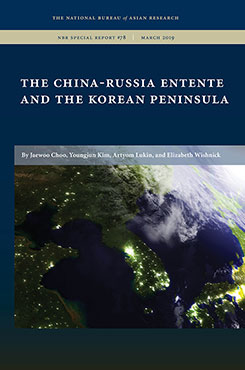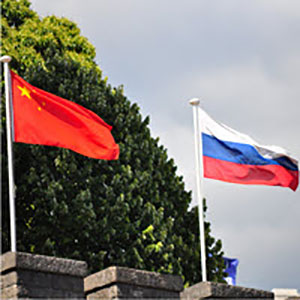China’s Strategic Cooperation with Russia and the Neutralization of the Korean Peninsula
This essay examines the linkage between China’s and Russia’s geopolitical struggles against the U.S. and their end goal of expelling U.S. forces from the Korean Peninsula and considers U.S. policy options.
EXECUTIVE SUMMARY
MAIN ARGUMENT
Cooperation between China and Russia is geopolitically driven to offset the political and security vulnerabilities stemming from their power struggle against the U.S.-led order. They need to overcome the inherent disadvantages embedded in their asymmetric power relations with the U.S. by aligning with each other for the time being and ultimately by neutralizing the Korean Peninsula through dismantlement of the U.S. alliance with the Republic of Korea (ROK). China and Russia have promoted a double-track approach that seeks to replace the Korean Armistice Agreement with a peace treaty in return for North Korea’s denuclearization. Ironically, President Donald Trump’s long-held doubts about the efficacy of alliances, and thus his desire to reduce U.S. force levels on the peninsula, which led him to engage directly with the North, now appear to be in line with China’s and Russia’s solutions to the North’s denuclearization question.POLICY IMPLICATIONS
- If Trump continues to discount the value of alliances for economic reasons and agrees to reduce U.S. force levels on the peninsula as a security assurance to North Korea, such actions will only help China and Russia achieve their goal of decoupling U.S.-ROK alliance relations and ultimately expelling U.S. forces from the Korean Peninsula.
- Likewise, if Trump continues to question the effectiveness of extended deterrence and joint military exercises, U.S. rivals could take the opportunity not only to neutralize the Korean Peninsula but also to further expand their influence in the region, thereby significantly undermining U.S. primacy.
- If the U.S. fails both to recognize the strategic implications of China’s and Russia’s vision for a permanent peace settlement on the Korean Peninsula and to update the alliance system, its inaction may well be perceived as an indicator of U.S. disinterest in upholding American values such as democracy, liberty, and free markets, let alone its commitment to alliances, thereby endangering trust and the country’s credibility as the world leader.
Jaewoo Choo is a Professor of Chinese Foreign Policy in the Department of Chinese Studies at Kyung Hee University in South Korea.



